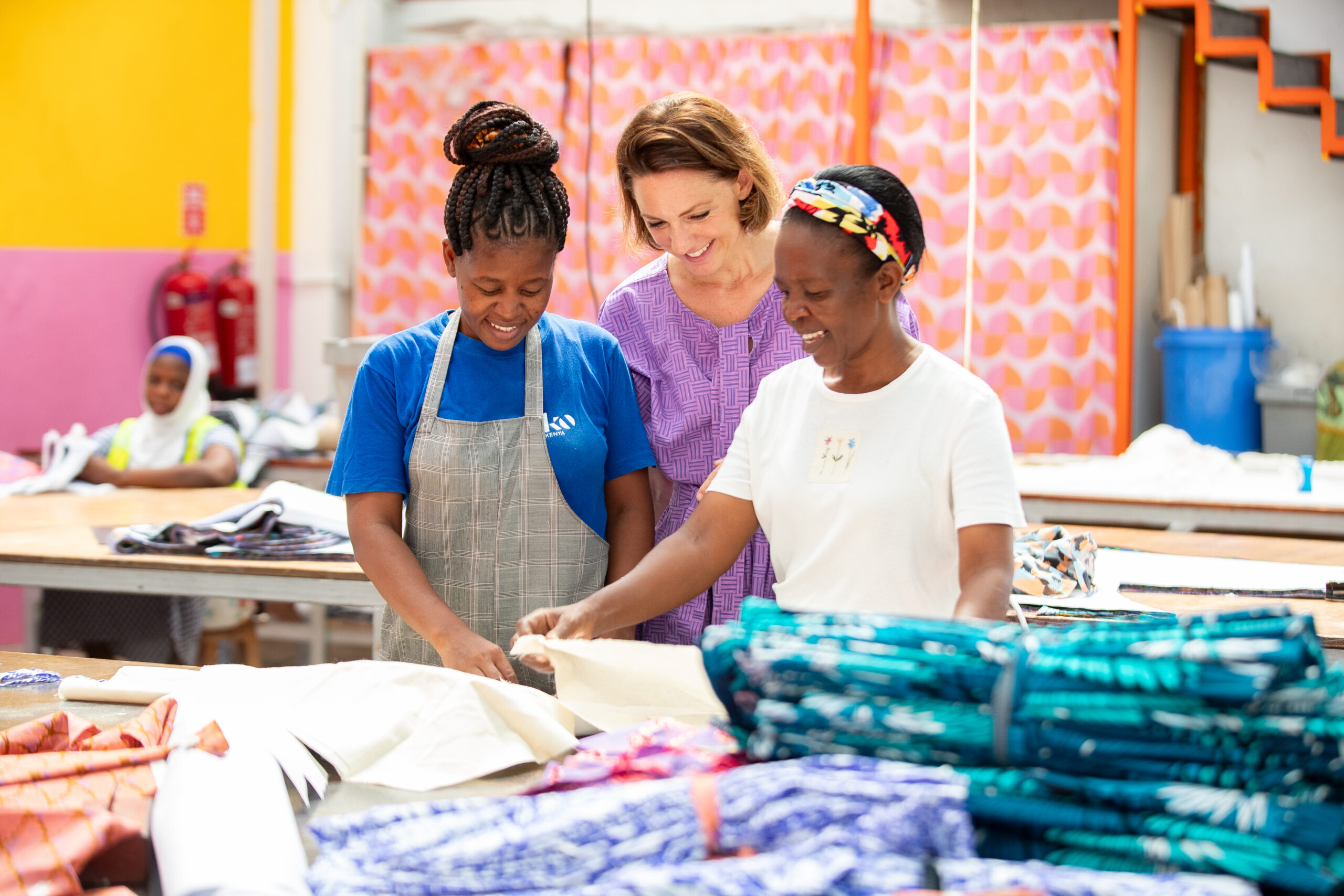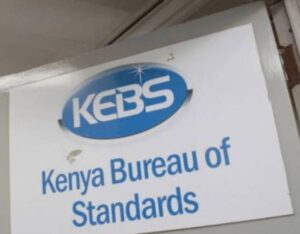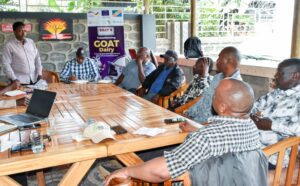
Joan Maiden With her employees. Photo | courtesy.
From a young age Joanna Maiden was troubled by the inequalities of the world. Born in London to a well to do family, she understood that having everything she wanted wasn’t worth it when others are suffering. She often thought of ways to lend a helping hand to the needy and bring positive change to the world.
Maiden had a deep fascination with fashion but she didn’t want to just admire the industry, instead she wanted to reshape it. Her goal was to tap into the fashion industry to alleviate poverty through creation of employment opportunities. Her journey began when she studied development economics before switching gears to fashion and textile. She worked in the fashion industry in England for a while before making a decision to move to Kenya to start her own company.
“I was fascinated by fashion—the supply chain, design, trends, and craftsmanship. I started connecting these interests when I studied development economics and later fashion and textiles, questioning whether fashion could be a vehicle for poverty reduction and positive change,” Maiden recalls.
In Kenya, she founded SOKO Kenya, a clothing manufacturing company.
“After working in the industry in London, I moved to Kenya in 2009 to build a clothing factory that prioritized people. That vision became SOKO Kenya, which now employs 150 people and includes a charity with a sewing training school and a period poverty program,” she says.
ALSO READ: Meet South Africa’s Retail Founder Of The Year 2024 – Foya Awards
She was first drawn to Kenya while working at the Ethical Fashion Forum. During a visit, she fell in love with Kenya, its people, and the opportunities she saw for meaningful change. “I wanted to create a business that prioritized fair wages, ethical production, and sustainability, proving that brands didn’t have to choose between responsible production and great design,” she says.
Starting a company is rarely smooth sailing. She says she faced her share of challenges in the early days of SOKO Kenya but she didn’t give up. “I didn’t have all the answers, I just kept listening, adapting, and focusing on improving every day,” she points out.
Maiden says that in business, one has to be a good listener especially when the industry is constantly changing. Listening to customer needs and attending to employees’ concerns has made her company stand out.
“Building strong relationships based on trust and shared values is essential, and listening to the needs of both employees and customers helps shape a sustainable business. Staying adaptable and open to learning has been key to our growth,” she says.

Beyond fashion, she is deeply invested in community empowerment. One of the biggest impacts has been through the Kujuwa Initiative, a program under the SOKO Community Trust that tackles period poverty.
“Through our charity Kujuwa Initiative, we have been able to reach thousands of schoolgirls, equipping them with reusable sanitary products and education, allowing them to stay in school and pursue their dreams,” she says.
In Kenya, 65 per cent of women and girls cannot afford sanitary protection, and 50 per cent of girls miss school when they have their periods. To date, the initiative has donated over 30,000 washable sanitary pads, providing sustainable solutions that reduce waste while supporting education.
With climate change and the race to preserve and protect the environment, SOKO Kenya boss says that her company has integrated environmentally friendly practices into its manufacturing processes to drastically reduce its carbon footprint.
“Our solar panels provide 75 per cent of our energy, saving around 11,000 kg of CO₂ annually,” she points out. The company also collects rainwater to reduce reliance on external sources and follows a strict “reduce, reuse, recycle” model. Every year, they divert around 2,500 kg of fabric waste from landfills by repurposing it into bags and accessories or donating it to the SOKO Community Trust Stitching Academy and to Kujuwa Initiative, for the production of washable sanitary pads.
When it comes to collaboration, Maiden works with brands whose values align with sustainability and ethical production. According to her, every partnership is built on trust, collaboration, and a long-term vision and at the same time recognizing and celebrating employees.
“We seek out brands that share our values and those that prioritize ethical production, sustainability, and transparency. Our approach is built on trust, collaboration, and a commitment to long-term relationships. We also believe in celebrating the people behind the clothes, ensuring that every partnership respects and values the livelihoods of our team,” Soko Kenya CEO affirms..
Having run a business for more than a decade in Kenya, Maiden is bullish that Kenya’s awash with entrepreneurs despite the challenges.
“Kenya has an incredibly entrepreneurial spirit, but there are challenges, particularly around access to raw materials and infrastructure,” she notes. To address these issues, she is working to support the continent in improving the availability of sustainable fabrics and enhancing local manufacturing capabilities. Her vision is to reshape global perceptions of African fashion and production. She adds that the fashion industry will grow when the industry player focuses on quality and people-centered approach.
“By focusing on quality, sustainability, and putting people first, we can open up new markets and strengthen our position in both the local and international fashion industry,” she says.
READ: Wowzi: How Friends Built A Company That Connect Creators With Brands
Maiden believes that ethical fashion is no longer a niche concept but consumers and brands alike are demanding greater transparency, and she aspires to be at the forefront of that shift.
“We’re proving that fashion can be a force for good. The industry is shifting—brands and consumers are demanding greater transparency, and ethical production is no longer a niche concept. Our goal is to continue leading by example, showing that sustainability and success go hand in hand. We aim to expand our impact through growth and more partnerships, strengthening our role in the industry,” she says.
“Building networks and surrounding yourself with the right people is key—your community will open doors and provide invaluable support,” she says. She also acknowledges the ever-present challenge of self-doubt. “Imposter syndrome is real, but remember that no one has all the answers; everyone is always learning. Trust in yourself and keep moving forward,” she says.
To aspiring entrepreneurs, Maiden believes that surrounding oneself with the right people and building networks opens doors and provides invaluable support. She says that when starting off you might not have all the answers but so is everyone else, therefore it’s vital to keep learning as you build.
“Focus on quality and integrity from day one, and build genuine partnerships that align with your values. Growth will follow,” she says in conclusion.




